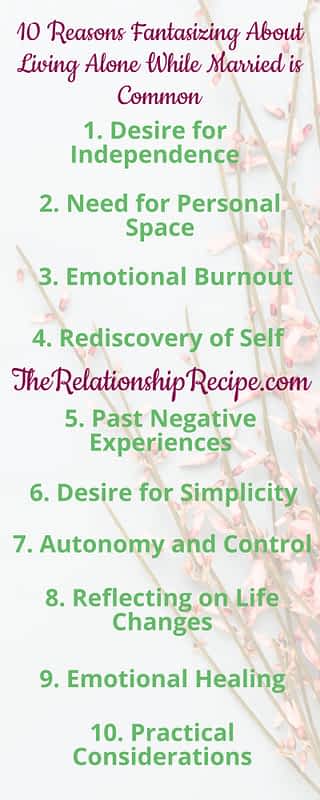Fantasizing About Living Alone? These 10 Truths Hit Hard
Fantasizing about living alone? … Same. Some days, I catch myself doing it hourly, like when I step over yet another pile of someone else’s laundry or hear the TV blaring from the next room. If you’re already picturing a calm, clutter-free space where no one talks to you unless you want them to… you’re in good company.
This whole daydream about living alone thing isn’t as weird or rare as people make it seem. Think about it: She-sheds, man caves, separate bedrooms – they’re everywhere now. Long-term marriages (like mine) quietly invent new ways to give each other space. It doesn’t always signal trouble. Sometimes it’s about craving independence while married or just needing room to breathe.
Why I daydream about living solo might look different than your reasons. It doesn’t always mean the relationship is crumbling. But if it is starting to feel shaky? We’ll get into that too.
🔑 Key Highlights
- When to see these thoughts as harmless escapes—and when they’re something deeper
- Why daydreaming about living solo is more common than you think
- The surprising emotional and psychological reasons behind these fantasies
- How feeling trapped in marriage can quietly shape your inner world
- What these solo living fantasies might be telling you about your needs

Daydreaming about living solo when you’re deep into a long-term marriage or relationship isn’t just some random thought. It usually comes from a mix of emotional overwhelm, mental exhaustion, and the very real craving for space, physically and emotionally. Whether it’s about peace and quiet, personal freedom, or just wanting to breathe without someone needing you… the reasons run deep.
Common Reasons For Fantasizing About Living Alone
1. Desire for Independence
👉 Reason: After years (maybe decades) of shared decisions, constant compromise, and blending your life with someone else’s, it’s natural to start craving independence. Not because you don’t love your partner, but because somewhere along the way, your own voice started to fade under the noise of “we” decisions.
✔️ Example: You fantasize about living alone and finally arranging the furniture exactly how you want it: no debates about wall colors, no compromising on decor, no side-eye over your candle collection. You can eat cereal for dinner, blast your favorite music, or enjoy total silence, and no one has a say but you.
2. Need for Personal Space
👉 Reason: When you live with someone (especially for years) it’s easy to feel like your body, time, and even thoughts are always accessible to someone else. Over time, this can lead to a quiet exhaustion you can’t quite name. Daydreaming about living solo becomes less about being alone and more about finally reclaiming some part of yourself.
✔️ Example: You imagine a quiet, peaceful space where no one’s calling your name from the other room, asking “What’s for dinner?” or following you into the bathroom to chat. Just uninterrupted stillness where you can breathe, scroll, cry, nap… whatever… without having to explain it.

3. Emotional Burnout
👉 Reason: When you’re the emotional manager of the relationship – the one keeping the peace, noticing the moods, smoothing the rough edges, it adds up. And if the relationship is tense or constantly draining, that burnout hits even harder. Fantasizing about living alone can feel like the only way to escape the constant emotional noise.
✔️ Example: You don’t just want a weekend off; you want a mental and emotional reset. No tiptoeing around someone’s bad mood. No pretending you’re fine when you’re clearly not. You picture a space where you can feel your feelings, fall apart if needed, and not have to explain a damn thing to anyone.
4. Rediscovery of Self
👉 Reason: Somewhere between raising kids, managing a household, and keeping a relationship afloat, it’s easy to lose track of you. As the years go by, you might start to feel more like a role (wife, mom, caretaker) than a full human. Fantasizing about living alone can be a quiet rebellion. A way of imagining who you’d be if no one needed anything from you.
✔️ Example: You picture waking up and actually asking yourself, What do I want to do today? – without factoring in five other people. Maybe you’d paint again. Travel. Start that book. Or just sit in silence with coffee and remember what it feels like to exist just for yourself.
5. Past Negative Experiences
👉 Reason: If you’ve been through relationships marked by control, conflict, or emotional neglect, it’s no wonder we daydream about living alone, because it feels like safety. It’s not just about peace and quiet – it’s protection. When your nervous system has been on high alert for years, solitude can feel like a survival plan.
✔️ Example: You imagine a space where you don’t have to brace yourself for someone’s anger or wonder if you’re “walking on eggshells” again. No tension. No emotional guessing games. Just your own energy, your own rules, and finally, some damn peace.

6. Desire for Simplicity
👉 Reason: Living with someone means juggling two lives: and all the mess, noise, and chaos that comes with it. When everything feels complicated or your constantly feeling emotionally exhausted, daydreaming about living solo becomes a way to dream of simplicity. A life where your energy goes to you, not endless compromises or cleanup.
✔️ Example: You picture a world where you only have to deal with your own clutter, your own schedule, and your own messes. No negotiating what’s for dinner, no asking permission for “me time,” just straightforward, manageable living.
7. Autonomy and Control
👉 Reason: When you live with someone else, there’s always a bit of negotiation; whether it’s about when to eat, what to watch, or how to spend your time. Daydreaming about living solo taps into a deep desire for total control over your space and schedule. It’s about calling the shots on your terms.
✔️ Example: You imagine the freedom to eat snacks at midnight, binge-watch your favorite shows without judgment, or decide to go to bed at 9 p.m. or 2 a.m., all without explaining yourself or checking in.

8. Reflecting on Life Changes
👉 Reason: When major life changes happen, like kids moving out, retirement, or a new career path, it’s common to start daydreaming about living solo. These transitions push us to rethink what we really want, especially if we’ve been feeling trapped in marriage or stuck in routines that no longer fit.
✔️ Example: You find yourself imagining a fresh start, a space that reflects who you are now, where you can focus on your own passions and freedom. It’s less about running from something and more about creating a life that finally feels like you.

9. Emotional Healing
👉 Reason: When you’ve been through tough, toxic relationships, or are feeling trapped in marriage, the idea of solitude becomes more than a luxury. It’s a chance to heal emotionally and reconnect with yourself. Daydreaming about living solo often means craving that space to process everything without distractions or pressure.
✔️ Example: You imagine time alone where you can finally sit with your feelings, unpack old wounds, and slowly rebuild your sense of self – without having to explain or apologize for needing that space..
10. Practical Considerations
👉 Reason: Sometimes, fantasizing about living alone isn’t just about feelings, it’s about reality. When financial independence or the right living situation becomes possible, that daydream starts feeling a lot more doable. Practical factors like these can make the idea of solo living exciting instead of just wishful thinking.
✔️ Example: You realize you’ve built enough financial stability to support yourself and start picturing what life would look like managing your own space, on your own terms, without compromises.

Does Fantasizing About Living Alone While Married Signal Trouble? How Normal Is This?
If you’re fantasizing about living alone while married, you might be wondering: Is this a red flag, or just a normal part of being human? The truth is, it can be both.
On one hand, daydreaming about your own space and freedom is totally normal. Everyone needs a mental break sometimes, especially after years of sharing your life with someone else. It’s a form of personal introspection, a way to check in with yourself and imagine what you really want.
But on the other hand, these fantasies can also be a gentle (or not-so-gentle) nudge that something deeper might be going on in your marriage. Maybe you’re feeling trapped in marriage, emotionally drained, or disconnected from your partner. Those daydreams can point to unmet needs or frustrations that deserve attention, not to scare you, but to encourage honest reflection.
So, while it’s perfectly normal to daydream about living alone, it’s also a good opportunity to ask yourself what these feelings mean for your relationship, and for you.
Here’s a balanced perspective on both aspects:

Fantasizing About Living Alone as a Sign of Marital Trouble
💣 Emotional Disconnect:
If you find yourself daydreaming about living solo a lot, it might be your mind’s way of telling you there’s an emotional gap between you and your partner. Maybe you’re feeling unheard, unsupported, or just plain misunderstood. When your heart feels a little empty in the marriage, the idea of living alone starts to look like freedom, a chance to breathe without having to explain yourself all the time.
💣 Unresolved Conflicts:
Or maybe you’re stuck in a cycle of stress and tension that never really gets solved. If you’re constantly bumping heads or avoiding the tough talks, it’s natural to daydream about living alone as an escape. That longing for space isn’t just about physical distance, it’s about needing a break from all the frustration and feeling trapped in marriage dynamics that don’t feel healthy.

💣 Need for Personal Space:
Sometimes, daydreaming about living solo is just your brain’s way of screaming for a little breathing room. If personal boundaries feel blurred or you and your partner are way too enmeshed, it’s easy to feel like you don’t have your own space to be you. Wanting to live alone here is really about craving autonomy – time and space to recharge without constantly navigating someone else’s needs.
💣 Feeling Overwhelmed:
When the weight of the relationship, household chores, or just life in general feels like too much, it’s normal to daydream about living alone. It’s your mind’s way of coping, imagining a place where you don’t have to juggle so many responsibilities or emotional labor. If this is hitting home, it might be time to rethink how you and your partner share the load, because feeling burnt out is never a good sign.
💣 Lack of Communication:
If tough talks get avoided or conversations feel like they hit a wall, it’s no surprise you might start fantasizing about living alone just to dodge the stress. When communication breaks down, those daydreams turn into a quiet retreat from all the unresolved stuff. It’s a sign that maybe you both need better ways to open up and really hear each other, rather than retreating into silence or solo daydreams.

Fantasizing About Living Alone as a Normal Experience
🚀 Craving Independence:
Daydreaming about living solo doesn’t always mean something’s broken. Sometimes, it just means you miss you. In a long-term relationship, it’s easy to lose bits of your independence without even realizing it. If you’re finding yourself daydreaming about living alone, it may not necessarilty mean you’re feeling trapped in marriage, it might be because you’re craving the freedom to make choices without compromise, to rediscover your rhythm without someone else’s routine layered on top. Wanting time alone isn’t selfish, it’s a way to reconnect with yourself and recharge your own energy, which can actually be really healthy.
💭 Personal Reflection:
Sometimes daydreamjing about living solo are less about escaping your partner and more about getting closer to yourself. During big life changes, like kids leaving the house, career changes, or even just a birthday that hits differently – it’s completely normal to feel a little reflective. That internal pull is your soul asking, “What do I want now?” Taking time to imagine a life that’s quieter, simpler, or more you can actually shine a light on your needs, your wants, and the parts of you that might’ve been put on the back burner. It’s not always about leaving… sometimes it’s about finding
🛋️ Temporary Escape:
When we daydream about living alone, it can feel like a mini vacation for your brain. When the laundry piles are high, the emotional labor is heavier, and you haven’t had a quiet moment in days, your mind might wander to a cozy little space where everything is yours and no one’s asking what’s for dinner. That doesn’t mean you’re planning an exit. Sometimes, imagining a quieter, simpler setup is just your way of decompressing. It’s a mental breather, not a marital red flag.
🌿 Autonomy and Self-Care:
Sometimes daydreaming about living solo isn’t really about being alone; they’re about being you. They can pop up when you’re feeling stretched too thin or like your needs are coming last. These quiet mental getaways are a reminder that your time, space, and peace matter too. They’re not selfish, they’re signals. Signals that it might be time to carve out more room for self-care, more room to breathe, and more freedom to move through life without constantly compromising.

Final Thoughts
If you’re daydreaming about living solo more than usual, you’re not broken, and your marriage isn’t automatically doomed. These thoughts can be little breadcrumbs leading you back to parts of yourself that got quiet over the years. Maybe it’s space you need. Maybe it’s clarity. Maybe it’s just a deep breath that lasts longer than 30 seconds without someone calling your name.
Fantasies like this aren’t shameful; they’re informative. So instead of brushing them off or panicking over what they might mean, listen. Let them guide you toward what you’re craving: more autonomy, more emotional safety, and a stronger connection to yourself.
You’re allowed to want peace—even if you’re still figuring out how to get there.

Thank you for reading this post, don't forget to subscribe!







